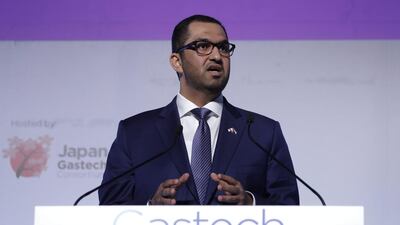The chief executive of Abu Dhabi National Oil Company (Adnoc) is targeting downstream natural gas investment partnerships in a bid to take advantage of a prolonged natural gas glut.
“Gas supply is not the issue,” Sultan Al Jaber, Adnoc’s chief executive, said on Tuesday at Gastech, the annual gas industry gathering in Tokyo.
“Today, what is needed is better infrastructure that efficiently links producer to end user,” he said in the opening keynote speech at the four-day event. “This will require nearly US$3 trillion in investment” globally over the next couple of decades, which in turn will require gas suppliers and buyers to form creative investment partnerships.
Pointing out that Abu Dhabi is more than tripling its domestic petrochemicals output by 2025 and is also expanding aggressively overseas through its Mubadala Investment Company subsidiaries, as well as looking to develop its supplies of gas, Mr Al Jaber said: “This is what we offer to partners who appreciate the scale of the opportunity before us, share our values and are willing to take risks: we at Adnoc are open for business and we invite you to join us.”
Mr Al Jaber, who took over as the chief of Adnoc just over a year ago, is also Minister of State and a member of the Supreme Petroleum Council, the emirate's top oil sector decision-making body. He told The National in January that Adnoc would in future seek more long-term partnerships than it had in the past, especially for downstream projects.
The world looks set to remain awash in liquefied natural gas (LNG) for some time to come, which could present opportunities, especially for state organisations with deep pockets and a long investment horizon.
This week, Qatar said it would lift a self-imposed moratorium on developing its huge North Field, which Wood Mackenzie reckons is a marker to show that the Arabian Gulf gas powerhouse will be more aggressive in future about holding on to market share, also to deter potential competitor projects.
“It’s a signal that Qatar intends to increase its market share, which has been falling as other regions have built new capacity,” WoodMac, an industry consultancy, said in a note to clients. “But it is also a threat to other developers of new capacity worldwide, as Qatar can add new capacity at a lower cost than anybody else.”
The world glut has depressed gas prices, especially for seaborne LNG, which became a truly globally traded commodity last year when the United States exported its first cargo.
“Gas is flooding into the market,” said WoodMac. “Since 2015, seven LNG projects have started operations and another 15 are in build. LNG output could grow by more than 100 million tonnes [mt] by 2020 to more than 360mt.”
Demand could grow from 264mt last year to 380mt or as much as 520mt by 2025, with the higher outcome dependent on how effective the industry is at convincing governments to pursue gas-for-coal substitution policies to reduce carbon emissions, according to Noel Tomnay, a WoodMac gas and power consultant.
The UAE has been a net importer of natural gas for the past six years as demand has risen sharply, with most of the imported supply coming from Qatar.
With gas prices depressed, the UAE stalled a project to build a new LNG intake terminal at the port of Fujairah and instead last September took the cheaper option of chartering a floating storage and regasification unit (FSRU) from Texas-based Excelerate to help to meet domestic gas demand.
As well as being a domestic and industrial fuel, gas is also one of the main feedstocks for petrochemicals production and after a doubling of output at its Ruwais joint venture petchems plant, Adnoc is having to use alternative oil-based feedstock from its nearby refinery for expansion.
Adnoc has set sourcing new gas supplies and projects as one of its priorities.
amcauley@thenational.ae
Follow The National's Business section on Twitter

